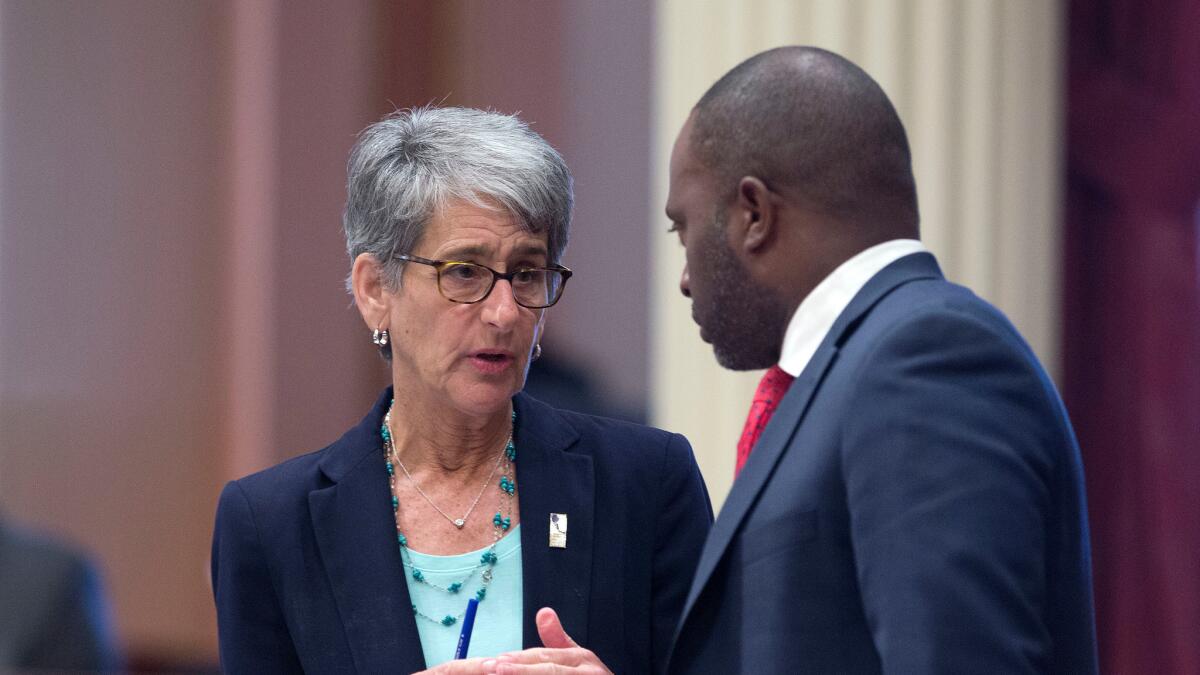Bill to ban behind-the-scenes communications with coastal commissioners is defeated in the Assembly

- Share via
A bill to ban behind-the-scenes communications at the California Coastal Commission went down to defeat in the Assembly on Wednesday night after facing strong opposition from labor, business groups and development interests.
The bill sought to prohibit so-called ex parte contacts that occur outside official public meetings between coastal commissioners and developers, lobbyists, environmentalists and other parties with a stake in commission business.
Those contacts can involve telephone calls, face-to-face meetings, e-mails or other written material. Commissioners must publicly disclose such interactions within a week of their occurrence, either in writing or orally at a public hearing.
Coastal commissioners in recent months have been subjected to scrutiny by courts and the media for failing to report these meetings or reporting them late or with little detail. A Times review of disclosure forms filed during the last two years showed that the majority of ex-partes involved developers or their lobbyists.
“I am extremely disappointed that this bill will not be moving forward this year,” said Sen. Hannah-Beth Jackson (D-Santa Barbara) who sponsored Senate Bill 1190. “I continue to believe that prohibiting ex parte communications is vital for restoring public trust in the Coastal Commission and leveling the playing field between big-moneyed interests and those without. Our coast is not the property of well-connected special interests.”
On the Assembly floor, the measure had received only 12 yes votes to 45 no votes when the coauthor, Assemblyman Patrick O’Donnell (D-Long Beach), placed the measure on hold to give supporters time for a last-ditch lobbying effort that went nowhere. Twenty-three Assembly members abstained. In the end, the measure was defeated 12 to 47.
Jackson said her bill, which was endorsed by the Coastal Commission and passed by the Senate, was necessary to promote open government, remove the possibility of backroom deal-making and help restore confidence in the commission since Executive Director Charles Lester was fired in February with little public explanation.
The measure, however, faced substantial resistance from at least a dozen business, labor, construction, real estate and agricultural organizations in the state. They included the California Farm Bureau Federation, the California Chamber of Commerce, the Western States Petroleum Assn. and the State Building and Construction Trades Council of California.
The California League of United Latin American Citizens also weighed in against the bill.
Before the vote, opponents of the bill said the ban would muzzle free speech by preventing interested parties, such as labor representatives, developers and environmentalists, from expressing their views to commission members.
Scott Wetch, a lobbyist for unions representing utility and electrical workers, has called the ban “undemocratic” and said the commission staff regularly dismisses labor’s positions on major projects as if jobs, economic benefits, wages and benefits for workers do not matter.
Under the California Coastal Act, however, the economic benefits of a development, such as job generation, are not to be considered when commissioners decide whether to approve a project. Commissioners are supposed to focus on issues such as public access to the coast, environmental concerns and the type of project.
The commission’s general counsel, Chris Pederson, wrote a letter to Wetch last week advising him of the limitations of the commission’s purview on economic issues.
“Members of the public who privately seek to influence the commission to act outside of the agency’s legal authority would be in essence exhorting decision makers to violate the law,” Pederson stated.
During the floor debate Wednesday, Assemblyman Donald Wagner (R-Irvine) accused Pederson of suggesting that anyone who discussed jobs and economic benefits with a commissioner would be doing something illegal.
Assemblywoman Lorena Gonzalez (D-San Diego), the chair of the Appropriations Committee, said she thought the ban “would take away the ability to have a full discussion about development.”
The bill’s supporters say ex parte contacts are predominately relied on by builders seeking approval for projects along California’s 1,100 miles of coast and can undermine the fairness of the court-like proceedings the commission uses for decision-making.
Public hearings, they say, provide an equitable forum at which all interested parties can openly provide information that might influence commissioners’ decisions.
“The ban would move the conversation from the back of the room to the front of the room,” O’Donnell said.
Jackson’s legislation also would have prevented commissioners from trying to influence the agency’s staff in the preparation of reports and recommendations related to commission business. This provision was designed to protect the independence of the staff, which is supposed to objectively evaluate projects and proposals free of political influence.
Twitter: @ladeadline16
MORE FROM THE LEGISLATURE
An overhaul of California’s taxi regulations passes
Lawmakers approve new climate plans to help California’s disadvantaged communities
California workers won’t be getting double pay for Thanksgiving day duty
More to Read
Sign up for Essential California
The most important California stories and recommendations in your inbox every morning.
You may occasionally receive promotional content from the Los Angeles Times.











